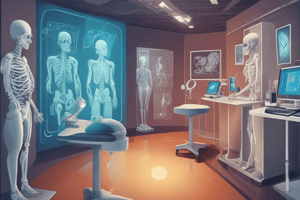Podcast
Questions and Answers
Which factors affect patient/image optimization?
Which factors affect patient/image optimization?
- Patient/Subject Factors
- Image-Quality Factors
- Exposure Technique Factors
- All of the above (correct)
Subject contrast is determined solely by the positioning of the patient.
Subject contrast is determined solely by the positioning of the patient.
False (B)
What does radiographic contrast depend on?
What does radiographic contrast depend on?
IR Contrast x Subject Contrast
Which body type is characterized as being large-framed and overweight?
Which body type is characterized as being large-framed and overweight?
What is the effect of patient thickness on x-ray attenuation?
What is the effect of patient thickness on x-ray attenuation?
Attenuation is the reduction of x-ray photons from interacting with matter.
Attenuation is the reduction of x-ray photons from interacting with matter.
What can increase or decrease tissue thickness or composition?
What can increase or decrease tissue thickness or composition?
Which of the following is NOT a result of taking good patient history?
Which of the following is NOT a result of taking good patient history?
What appearance does radiopaque tissue have on a radiograph?
What appearance does radiopaque tissue have on a radiograph?
Radiolucent tissue attenuates few x-rays and appears ___ on the radiograph.
Radiolucent tissue attenuates few x-rays and appears ___ on the radiograph.
Study Notes
Patient/Subject Factors
- Subject Contrast: Affects the degree of differential absorption. It's a component of radiographic contrast determined by the size, shape, and x-ray attenuating characteristics of the subject being examined.
- Patient Thickness: Thicker sections attenuate more x-rays than thinner sections.
- Tissue Mass Density: Different patients can have equal thicknesses but different mass densities. Dense areas attenuate more x-rays.
- Effective Atomic Number: Affects subject contrast. Tissues with similar atomic numbers have similar attenuation characteristics, leading to lower contrast.
- Object Shape: The shape of the object influences how x-rays interact with it.
Patient/Subject Contrast
- Radiographic Contrast: Determined by the combination of image receptor (IR) contrast and subject contrast.
- High Subject Contrast: Produces significant differences in x-ray attenuation, resulting in an image with high contrast.
- Low Subject Contrast: Represents minimal differences in x-ray attenuation, producing an image with low contrast.
Body Types
- Hypersthenic: Large frame, overweight
- Sthenic: Average, strong, active
- Hyposthenic: Thin, but healthy appearance
- Asthenic: Small, frail, emaciated
Attenuation
- The reduction in the total number of x-ray photons remaining in the beam after passing through a given thickness of material.
- The result of x-rays interacting with matter and being absorbed or scattered.
Pathology
- Specific diseases can alter tissue thickness or composition, affecting the effective atomic number or density.
- Review patient requisitions for history or diagnoses to anticipate potential pathology.
- Examples: Degenerative diseases, Emphysema, Ascites, Hemothorax, Osteoporosis
- Radiopaque: Absorbs x-rays, appearing white on an image. Examples include bone and metal hardware.
- Radiolucent: Attenuates few x-rays, appearing dark on an image. Examples include air and soft tissue.
Studying That Suits You
Use AI to generate personalized quizzes and flashcards to suit your learning preferences.
Related Documents
Description
Test your knowledge on the various factors affecting radiographic subject contrast. This quiz covers concepts such as subject contrast, patient thickness, tissue mass density, and effective atomic number. Enhance your understanding of how these elements influence x-ray imaging results.




